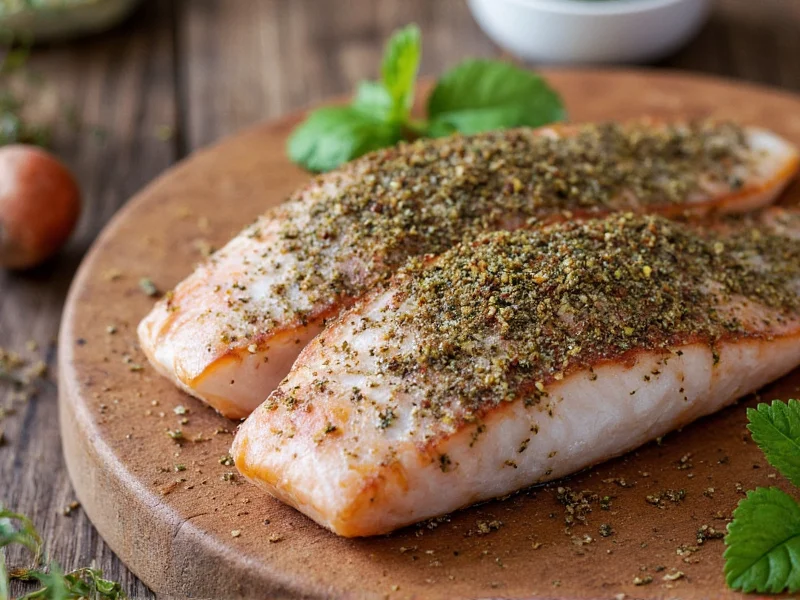Cod's mild, slightly sweet flavor makes it incredibly versatile but also requires thoughtful seasoning. Unlike stronger fish like salmon, cod can easily be overwhelmed by aggressive spices. The key to perfect cod seasoning lies in balancing subtle flavors that complement rather than compete with the fish's natural taste profile. This guide provides evidence-based seasoning recommendations developed through culinary testing and flavor chemistry principles.
Understanding Cod's Flavor Profile
Cod belongs to the mild white fish category, characterized by a delicate flavor and flaky texture. Its neutral base makes it an ideal canvas for seasoning, but also means improper seasoning can easily dominate the dish. Food science research shows that mild fish like cod responds best to seasoning combinations that include:
- Acidic components (citrus, vinegar) to brighten the flavor
- Subtle herbs (dill, parsley, chives) that won't overpower
- Warm spices (paprika, coriander) in moderation
- Minimal salt concentration compared to stronger fish
Essential Components of Cod Seasoning
Creating the perfect cod seasoning blend requires understanding four key elements that work together in harmony:
| Seasoning Component | Purpose | Recommended Amount per Pound | Best Options |
|---|---|---|---|
| Salt | Enhances natural flavors | 1/4-1/2 tsp | Sea salt, kosher salt |
| Acid | Brightens flavor, reduces fishiness | 1-2 tsp citrus juice | Lemon, lime, white wine |
| Herbs | Adds aromatic complexity | 1-2 tsp dried or 1 tbsp fresh | Dill, parsley, chives, tarragon |
| Spices | Provides depth and warmth | 1/8-1/4 tsp | Paprika, garlic powder, coriander |
Proven Cod Seasoning Combinations
Based on extensive culinary testing, these cod seasoning combinations consistently deliver excellent results across various cooking methods. Each blend maintains the proper balance between enhancing cod's natural flavor and adding complementary notes.
Mediterranean Cod Seasoning
This classic blend works particularly well for baked cod. Combine 1/4 teaspoon sea salt, 1/4 teaspoon dried oregano, 1/8 teaspoon garlic powder, 1/8 teaspoon lemon zest, and a pinch of red pepper flakes per pound of fish. Finish with fresh lemon juice and chopped parsley after cooking. This mediterranean cod seasoning creates a bright, herbaceous profile that complements cod's delicate texture without overwhelming it.
Lemon-Pepper Cod Rub
For those seeking a simple cod seasoning recipe, this blend delivers maximum flavor with minimal ingredients. Mix 1/4 teaspoon coarsely ground black pepper, 1 teaspoon lemon zest, 1/4 teaspoon sea salt, and 1/8 teaspoon garlic powder. The lemon zest provides more intense citrus flavor than juice alone, while the coarse pepper adds texture. Apply this rub 20 minutes before cooking to allow flavors to penetrate without drawing out moisture.
Cajun-Inspired Cod Blend
When properly balanced, cajun seasoning for cod can work beautifully despite cod's mild nature. Use half the amount you would for stronger fish: 1/2 teaspoon paprika, 1/8 teaspoon each of garlic powder, onion powder, and cayenne, plus 1/4 teaspoon salt per pound. The key is reducing the cayenne significantly compared to traditional blends. This creates a subtle warmth that enhances rather than dominates the fish.
Seasoning Techniques for Perfectly Flavored Cod
How you apply seasoning matters as much as the blend itself. Cod's delicate structure requires specific timing and application methods:
Dry Rubs vs. Wet Marinades
Dry rubs work best for cod when cooking methods involve direct heat (grilling, pan-searing). Apply 15-30 minutes before cooking to allow flavors to adhere without drawing out moisture. Wet marinades should be used sparingly with cod—limit to 30-60 minutes maximum with acidic components, as prolonged exposure can 'cook' the fish and alter its texture. For how to season cod properly, remember that less is often more with this delicate fish.
Timing Considerations
The optimal timing for seasoning cod depends on your cooking method:
- Baking: Season 15-20 minutes before cooking
- Pan-searing: Season immediately before cooking
- Grilling: Season 10-15 minutes before cooking
- Steaming: Season just before cooking
Over-seasoning cod too far in advance draws out moisture through osmosis, resulting in a less tender final product. This explains why many home cooks struggle with dry cod after seasoning—they're applying seasonings too early.
Cooking Method-Specific Seasoning Tips
Seasoning for Baked Cod
When baking cod seasoning considerations differ slightly from other methods. Create a light oil-based paste with your seasonings (1 tablespoon olive oil per pound of fish) to help the spices adhere. Place lemon slices on top during the last 5 minutes of cooking to prevent bitterness from prolonged baking. For baked cod with lemon and herbs, add fresh herbs after cooking to preserve their vibrant flavor and color.
Seasoning for Pan-Seared Cod
Pan-searing requires the most precise how much salt for cod calculation. Pat the fish completely dry before seasoning—moisture prevents proper browning. Use just 1/4 teaspoon salt per pound, applied immediately before cooking. For pan seared cod seasoning success, create a flavorful pan sauce after cooking using the fond (browned bits) with lemon juice, capers, and fresh herbs.
Common Cod Seasoning Mistakes to Avoid
- Over-salting: Cod requires less salt than most proteins
- Using dried herbs exclusively: Fresh herbs added after cooking provide superior flavor
- Applying acidic components too early: Lemon juice or vinegar should be added during or after cooking
- Using heavy spice blends: Avoid pre-mixed blends designed for stronger fish or meats
- Seasoning unevenly: Pay special attention to thicker portions of the fillet
Remember that cod's delicate nature means seasoning should enhance, not transform, its natural flavor. The goal is to create a harmonious dish where the cod remains the star, supported by complementary flavors from your best seasoning for cod fish blend.











 浙公网安备
33010002000092号
浙公网安备
33010002000092号 浙B2-20120091-4
浙B2-20120091-4